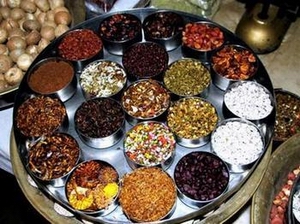 From ancient times, India has been considered the "Spice Bowl of the World."
From ancient times, India has been considered the "Spice Bowl of the World."Indian Spices have been known for their flavouring effect on Indian curries but little may we know about the nutritional value of these spices and the medicinal effect they have.
As spices are used in minimal quantities they hardly contribute to calories or proteins. Their major contribution is towards providing minerals, vitamins and trace minerals in the diet.
Cardamom is considered an exotic spice to add flavor to mainly Indian delicacies which have a sweet taste. This exotic spice contains many plant derived chemical compounds that are known to have anti-oxidant, disease preventing and health promoting properties.
It contains essential volatile oils that have antiseptic, antispasmodic properties. A pod of cardamom chewn after meals works as a digestive and a diuretic and helps in relieving gas and inflammation.
Also Cardamom is a good source of minerals like potassium, copper, and magnesium. Potassium is an important component of cell and body fluids that helps control heart rate and blood pressure. Copper is required in the production of red blood cells.
Additionally, it is also an excellent source of iron and manganese. Iron is required for red blood cell formation and cellular metabolism. Manganese is a co-factor for the enzyme, superoxide dismutase, which is a very powerful free radical scavenger.
Further, these aromatic pods are rich in many vital vitamins, including riboflavin, niacin, vitamin-C which are essential for optimum health. The therapeutic properties of cardamom oil have found application in many traditional medicines as antiseptic and local anesthetic.
Cardamom, Nutritional value per 100 g. (Source: USDA National Nutrient data base)
| Principle | Nutrient Value | Percentage of RDA |
| Vitamins | ||
| Thiamin | 0.198 mg | 16.50% |
| Vitamin C | 21 mg | 35% |
| Electrolytes | ||
| Sodium | 18 mg | 1% |
| Potassium | 1119 mg | 24% |
| Minerals | ||
| Calcium | 383 mg | 38% |
| Copper | 0.383 mg | 42.50% |
| Iron | 13.97 mg | 175% |
| Magnesium | 229 mg | 57% |
| Manganese | 28 mg | 1217% |
| Phosphorus | 178 mg | 25% |
| Zinc | 7.47 mg | 68% |
Cloves are one of the highly prized spices, widely recognized all over the world for their medicinal and culinary qualities.
The active principles in the clove are known to have antioxidant, anti-septic, local anesthetic, anti-inflammatory and anti-flatulent properties.
The spice contains health benefiting essential oils such as eugenol. Eugenol has local anesthetic and antiseptic properties, and is used for relieving pain and causing numbness during dental care.
The essential volatile oils functions as a rubefacient, which means that expands the blood vessels, increasing the flow of blood to make the skin feel warmer, making it a popular home remedy for arthritis and sore muscles, used either as a poultice or in hot baths.
Clove oil is also used in aromatherapy.
The active principles in the clove may increase gut motility as well as improve the digestion power by increasing gastro-intestinal enzyme secretions. Thus, relieving indigestion and constipation problems.
The spice also contains a good amount of minerals like potassium, manganese, iron, selenium and magnesium. Potassium is an important electrolyte of cell and body fluids that helps control heart rate and blood pressure. Manganese is used by the body as a co-factor for the antioxidant enzyme superoxide dismutase.





